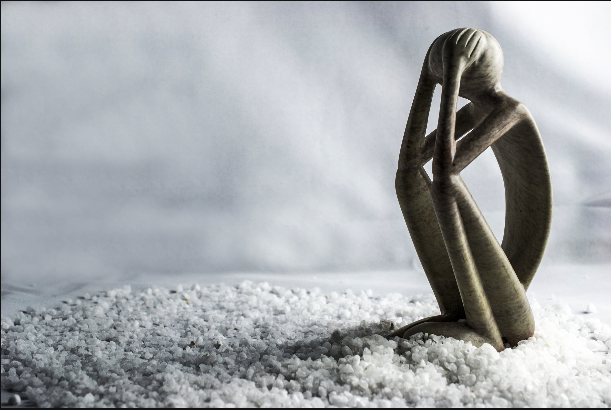St. Luke's Episcopal Chapel, Grambling, La.
A few weeks ago, I had a conversation with a friend who was going through a hard time. She has an adult daughter who suffers from bipolar disorder.
I have experienced mental illness in the family and it is a tough road to walk—a very tough road. Every member of the family is affected by it. You might say, accurately, in my view, that when one member of the family suffers from mental illness the entire family suffers.
My friend described some of her conversations with her daughter and some of the terribly hurtful things her daughter has said to her. Apparently the daughter views her mother as the source of all her problems, and she berates her mother in ways that break her mother’s heart.
So I said two things to my friend. First, and I know this doesn’t help very much, but first remember that it is the mental illness speaking, not your daughter per se. Expecting a mentally ill person to interact normally is like expecting a person with a broken leg to run a marathon.
Second, I said to my friend, get some help from a professional yourself who will help you set some healthy boundaries with your daughter. I went on to explain that her daughter was saying abusive things to her and nothing in the concept of parental love and nothing in the concept of Christian love requires us to accept abuse at the hands of family, friends or anyone else.
I sometimes think we are a bit simplistic in our approach to Jesus’ mandate that we love even our enemies and people who seek to do us harm. That particular friend is not the first or only person to interpret today’s Gospel lesson in ultimately self-destructive ways.
Of course the call to not judge or condemn others and to love our enemies is real and serious; Jesus was not joking when he said this. So our challenge is to find ways to love, on both individual and societal levels, that do not involve acquiescing to evil or to oppressive social systems and cultural norms, or to being a doormat to every abusive person in our social circles.
One such way—the best way I know—to love those who do us wrong is by being quick to forgive, unconditionally, and even when the other has not asked forgiveness. This is God’s way, and besides being God’s way, it is also good for us. We forgive for our own sake as much as or more than we forgive for the other’s sake.
Being stuck in unforgiveness will eat a person alive. It takes mental and emotional energy to hold on to and nurse our wounds, mental and emotional energy that is therefore unavailable for joy and wonder and gratitude.
Forgiveness is not an emotion we feel so much as a choice we make—a choice that liberates us from a shrunken, dreary world of bitterness and anger and fear.
Forgiveness also is NOT saying that the evil or hurt or abuse that happened is now suddenly “okay.” We have all heard, and probably have been admonished by someone, to “forgive and forget.” To which I say, “Nonsense.”
Back when I was in graduate school at the University of Pennsylvania, one of our sociology professors wrote a book titled “Forgive and Remember: Managing Medical Failure.” I never read the book because I always felt that the title said it all.
Forgive, and remember.., because only by remembering can we establish and maintain healthy boundaries in our interpersonal relationships.
Forgive and remember because only by remembering can we learn from and overcome the evils of the past.
Post World War II Germany is the best example I know of a society seeking to do that. Nazi concentration camps and the site of Hitler’s rise to power in Nuremburg have been converted into teaching museums that confront the evil that was the Holocaust with gut-wrenching honesty and lay out details of how and why it happened—all to the cause of making sure it never happens again.
These not-so-United States of America need to do the same. We need to confront and own the evils of our own past—the genocide of Native American peoples and the building of our country and economy on the backs of enslaved Africans.
We as a society have not done that. Far too many are still engaged in denial and in rejecting responsibility because the actual perpetrators are long dead. But we as a society will never heal from the divisions rooted in those evils until we have named them and claimed them, fully and with brutal honesty.
Archbishop Desmond Tutu and his priest daughter Mpho turned their own experience of and struggle against the evil of apartheid into a book called “The Book of Forgiving.” In it they write:
Forgiving does not require that we carry our suffering in silence or be martyrs on a cross of lies. Forgiveness does not mean that we pretend things are anything other than they are. Forgiving requires giving voice to the violations and naming the pains we have suffered.
So we love our enemies and those who hurt us by forgiving them because it is good for us and frees us from tending our pile of hurts. We forgive and love for our own sake.
We also love and forgive because mercy and forgiveness are God’s way, which we are committed to following. We forgive for God’s sake.
But finally we also forgive for the sake of those very enemies, the sake of those who have hurt us, for it is through forgiveness that we acknowledge their humanity. By forgiving, we set free those we are forgiving to change, to grow, to become more fully human.
Only in the context of forgiveness can transformation happen. It might be a long time coming. We might never live to see the transformation our forgiveness makes possible. But only in the context of forgiveness can transformation happen.
I will give the last word today again to Desmond and Mpho Tutu, who wrote:
Just as we take a leap of faith when we make a commitment to love someone and get married, we also take a leap of faith when we commit ourselves to a practice of forgiveness.
In the name of God, Father, Son and Holy Spirit, AMEN.



No comments:
Post a Comment